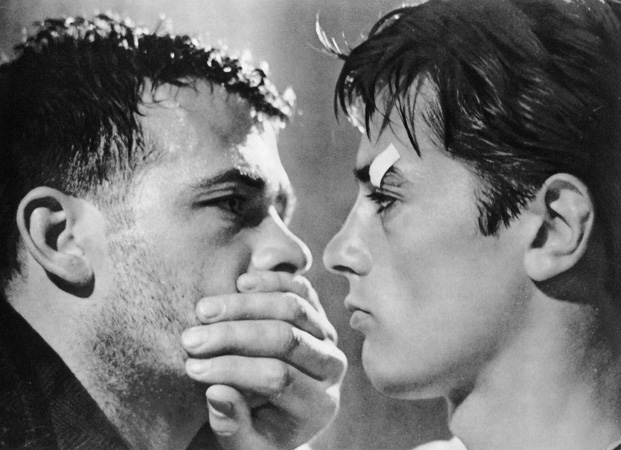Luchino Visconti / Italy / 1960 / 177min
Available on Blu-ray
1960 was a bumper year for Italian cinema. Fellini’s La Dolce Vita was a three-hour epic satire on the sparking modern world in danger of going flat that became an international hit. Rocco and His Brothers is closer to Italian neorealism, a kissing cousin of Britain’s kitchen-sink dramas of the time.
Rocco (Alain Delon – in the 1960s he was the most beautiful man alive), his brothers and mother have travelled from their failing farm in the south to find work and start a new life in prosperous, dangerous Milan. It’s winter and there is work shovelling snow or at the Alfa Romeo factory. But brother Simone (Renato Salvatori) has his eyes on a boxing prize. You can almost smell the sweat and cheap aftershave. As the migrant family move into a cramped, cold-water flat neighbours call them “layabouts” and “dirt pushers” come to sponge off the rich north. There is romance in the shape of a good-time girl Nadia (Annie Giradot in a powerful, unforgettable performance). But Rocco longs for the farm and its sunny olive groves as much as he loathes the city (and boxing) and its ability to corrupt.
As Simone’s boxing career wanes, Rocco is noticed by a promoter when the brothers spar. The sport offers big money and a route out of the slums. Rocco eclipses Simone in the ring and takes up with Nadia, Simone’s ex. When enraged Simone and his mates find the lovers together he makes Rocco watch as he rapes Nadia in a brutal, unforgivable act of revenge with echoes of Greek tragedy. Simone later takes his anger out on Nadia, who now despises him, with tragic results.
Rocco is the flipside of Fellini’s discourse on decadent Rome but in many ways more shocking to modern eyes. In 1960 the censors and Catholic Church decried the movie as much for telling uncomfortable truths about Italy’s rapidly changing society as for its graphic violence. It still retains an electrifying homoerotic edge – there are hints that the brothers will sell their bodies to pay off assorted debts.
It’s a dense, sober movie and a demanding watch – two parts neorealism to one part grand opera – that sometimes borders on the hysterically overemotional but will be rewarded by repeat viewings. The cinematography (Goffredo Lombardo) has been described by film writer David Thomson as “velvety noir”. There is a wonderful score by that arch-modernist Nino Rota and a fine cast.
